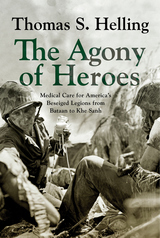8 start with O start with O
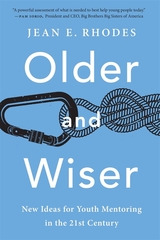
Youth mentoring programs must change in order to become truly effective. The world’s leading expert shows how.
Youth mentoring is among the most popular forms of volunteering in the world. But does it work? Does mentoring actually help young people succeed? In Older and Wiser, mentoring expert Jean Rhodes draws on more than thirty years of empirical research to survey the state of the field. Her conclusion is sobering: there is little evidence that most programs—even renowned, trusted, and long-established ones—are effective. But there is also much reason for hope.
Mentoring programs, Rhodes writes, do not focus on what young people need. Organizations typically prioritize building emotional bonds between mentors and mentees. But research makes clear that effective programs emphasize the development of specific social, emotional, and intellectual skills. Most mentoring programs are poorly suited to this effort because they rely overwhelmingly on volunteers, who rarely have the training necessary to teach these skills to young people. Moreover, the one-size-fits-all models of major mentoring organizations struggle to deal with the diverse backgrounds of mentees, the psychological effects of poverty on children, and increasingly hard limits to upward mobility in an unequal world.
Rhodes doesn’t think we should give up on mentoring—far from it. She shows that evidence-based approaches can in fact create meaningful change in young people’s lives. She also recommends encouraging “organic” mentorship opportunities—in schools, youth sports leagues, and community organizations.

Winner of the Eleanor Maccoby Book Award
“This engaging and well-written book is a significant advance in our understanding of when and how mentoring matters…[It] lays the foundations for an approach to mentoring that is both rigorous and rich in new ideas.”
—Robert D. Putnam, author of Our Kids: The American Dream in Crisis
“Rhodes forces us to slam the brakes on ineffective practices and improve an industry that is devoted to the potential of our nation’s children…The author’s concrete recommendations will create new pathways to opportunity for youth in greatest need.”
—Michael D. Smith, Executive Director, My Brother’s Keeper Alliance
“A powerful assessment of what is needed to best help young people today.”
—Pam Iorio, President and CEO, Big Brothers Big Sisters of America
Youth mentoring is one of the most popular forms of volunteering in the world today, but does it work? Drawing on over thirty years of research and her own experience in the field, Jean Rhodes reveals that most mentoring programs fail to deliver what young people actually need. Many prioritize building emotional bonds between mentors and mentees. But research shows that effective programs go far beyond this, developing specific social, emotional, and intellectual skills.
Most mentoring programs rely on volunteers, who rarely have the training to teach these skills. Their one-size-fits-all models struggle to meet the diverse needs of mentees, and rarely take account of the psychological effects of poverty on children. Rhodes doesn’t think we should give up on mentoring—far from it. Instead, she recommends “organic” mentorship opportunities—in schools, youth sports leagues, and community organizations—and shares specific approaches that can spark meaningful change in young people’s lives.
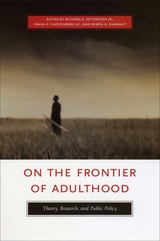
This volume considers the nature and consequences of changes in early adulthood by drawing upon a wide variety of historical and contemporary data from the United States, Canada, and Western Europe. Especially dramatic shifts have occurred in the conventional markers of adulthood—leaving home, finishing school, getting a job, getting married, and having children—and in how these experiences are configured as a set. These accounts reveal how the process of becoming an adult has changed over the past century, the challenges faced by young people today, and what societies can do to smooth the transition to adulthood.
"This book is the most thorough, wide-reaching, and insightful analysis of the new life stage of early adulthood."—Andrew Cherlin, Johns Hopkins University
"From West to East, young people today enter adulthood in widely diverse ways that affect their life chances. This book provides a rich portrait of this journey-an essential font of knowledge for all who care about the younger generation."—Glen H. Elder Jr., University of North Carolina at Chapel Hill
"On the Frontier of Adulthood adds considerably to our knowledge about the transition from adolescence to adulthood. . . . It will indeed be the definitive resource for researchers for years to come. Anyone working in the area—whether in demography, sociology, economics, or developmental psychology—will wish to make use of what is gathered here."—John Modell, Brown University
"This is a must-read for scholars and policymakers who are concerned with the future of today's youth and will become a touchpoint for an emerging field of inquiry focused on adult transitions."—Jeanne Brooks-Gunn, Columbia University

On Your Own Without a Net documents the special challenges facing seven vulnerable populations during the transition to adulthood: former foster care youth, youth formerly involved in the juvenile justice system, youth in the criminal justice system, runaway and homeless youth, former special education students, young people in the mental health system, and youth with physical disabilities. During adolescence, government programs have been a major part of their lives, yet eligibility for most programs typically ends between the ages of eighteen and twenty-one. This critical volume shows the unfortunate repercussions of this termination of support and points out the issues that must be addressed to improve these young people's chances of becoming successful adults.
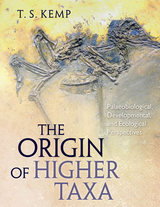
Looking beyond the microevolutionary force of Darwinian natural selection, Kemp enters the realm of macroevolution, or evolution above the species level. From the origin of mammals to the radiation of flowering plants, these large-scale patterns—such as the rise of novel organismal design, adaptive radiations, and lineage extinctions—encompass the most significant trends and transformations in evolution. As macroevolution cannot be studied by direct observation and experiment, scientists have to rely on the outcome of evolution as evidence for the processes at work, in the form of patterns of species appearances and extinctions in a spotty fossil record, and through the nature of species extant today. Marshalling a wealth of new fossil and molecular evidence and increasingly sophisticated techniques for their study, Kemp here offers a timely and original reinterpretation of how higher taxa such as arthropods, mollusks, mammals, birds, and whales evolved—a bold new take on the history of life.
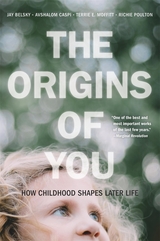
A Marginal Revolution Book of the Year
After tracking the lives of thousands of people from birth to midlife, four of the world’s preeminent psychologists reveal what they have learned about how humans develop.
Does temperament in childhood predict adult personality? What role do parents play in shaping how a child matures? Is day care bad—or good—for children? Does adolescent delinquency forecast a life of crime? Do genes influence success in life? Is health in adulthood shaped by childhood experiences? In search of answers to these and similar questions, four leading psychologists have spent their careers studying thousands of people, observing them as they’ve grown up and grown older. The result is unprecedented insight into what makes each of us who we are.
In The Origins of You, Jay Belsky, Avshalom Caspi, Terrie Moffitt, and Richie Poulton share what they have learned about childhood, adolescence, and adulthood, about genes and parenting, and about vulnerability, resilience, and success. The evidence shows that human development is not subject to ironclad laws but instead is a matter of possibilities and probabilities—multiple forces that together determine the direction a life will take. A child’s early years do predict who they will become later in life, but they do so imperfectly. For example, genes and troubled families both play a role in violent male behavior, and, though health and heredity sometimes go hand in hand, childhood adversity and severe bullying in adolescence can affect even physical well-being in midlife.
Painstaking and revelatory, the discoveries in The Origins of You promise to help schools, parents, and all people foster well-being and ameliorate or prevent developmental problems.
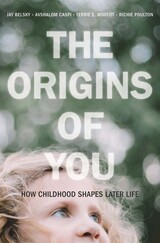
A Marginal Revolution Book of the Year
“Brings the groundbreaking research of the top developmental psychologists of the past quarter-century to a wider audience…A masterpiece!”—Dante Cicchetti, Institute for Child Development at the University of Minnesota
“Deliver[s] a flood of insights around the book’s central question: To what degree do our childhood personalities and behaviors predict our adult selves?”—Wall Street Journal
“One of the best and most important works of the last few years…Fascinating.”—Tyler Cowen, Marginal Revolution
Does childhood temperament predict adult personality? What role do parents play in shaping how a child matures? Is day care bad—or good—for children? Does adolescent delinquency forecast a life of crime? Do genes influence success in life? Is one’s health shaped by childhood experiences? In search of answers to these questions, four leading psychologists dedicated their careers to studying thousands of people, observing them as they grew and emerging with unprecedented insight into what makes us who we are.
They found that human development is not subject to ironclad laws so much as a matter of possibilities and probabilities—multiple forces that together determine the direction of one’s life. The early years do predict who we become, but they do so imperfectly. At once actionable and revelatory, The Origins of You is an invaluable guide for parents, teachers, and anyone working with or caring for children.

Seventy deeply troubled teenagers spend weeks, months, even years on a locked psychiatric ward. They’re not just failing in school, not just using drugs. They are out of control—violent or suicidal, in trouble with the law, unpredictable, and dangerous. Their futures are at risk.
Twenty years later, most of them still struggle. But astonishingly, a handful are thriving. They’re off drugs and on the right side of the law. They’ve finished school and hold jobs that matter to them. They have close friends and are responsible, loving parents.
What happened? How did some kids stumble out of the woods while others remain lost? Could their strikingly different futures have been predicted back during their teenage struggles? The kids provide the answers in a series of interviews that began during their hospitalizations and ended years later. Even in the early days, the resilient kids had a grasp of how they contributed to their own troubles. They tried to make sense of their experience and they groped toward an understanding of other people’s inner lives.
In their own impatient voices, Out of the Woods portrays edgy teenagers developing into thoughtful, responsible adults. Listening in on interviews through the years, narratives that are often poignant, sometimes dramatic, frequently funny, we hear the kids growing into more composed—yet always recognizable—versions of their tough and feisty selves.
READERS
Browse our collection.
PUBLISHERS
See BiblioVault's publisher services.
STUDENT SERVICES
Files for college accessibility offices.
UChicago Accessibility Resources
home | accessibility | search | about | contact us
BiblioVault ® 2001 - 2024
The University of Chicago Press



